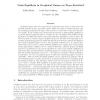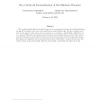145
click to vote
ATAL
2010
Springer
15 years 3 months ago
2010
Springer
We consider the computational complexity of pure Nash equilibria in graphical games. It is known that the problem is NP-complete in general, but tractable (i.e., in P) for special...
130
click to vote
SIGECOM
2003
ACM
15 years 7 months ago
2003
ACM
We examine correlated equilibria in the recently introduced formalism of graphical games, a succinct representation for multiplayer games. We establish a natural and powerful rela...
129
click to vote
SIGECOM
2006
ACM
15 years 8 months ago
2006
ACM
We present a reduction from graphical games to Markov random fields so that pure Nash equilibria in the former can be found by statistical inference on the latter. Our result, wh...
111
click to vote
SIGECOM
2006
ACM
15 years 8 months ago
2006
ACM
Graphical games have been proposed as a game-theoretic model of large-scale distributed networks of non-cooperative agents. When the number of players is large, and the underlying...
107
click to vote
CSCLP
2007
Springer
15 years 8 months ago
2007
Springer
The notion of optimality naturally arises in many areas of applied mathematics and computer science concerned with decision making. Here we consider this notion in the context of ...
140
click to vote
ICALP
2009
Springer
16 years 2 months ago
2009
Springer
We consider graphical games in which edges are zero-sum games between the endpoints/players; the payoff of a player is the sum of the payoffs from each incident edge. We give a si...


